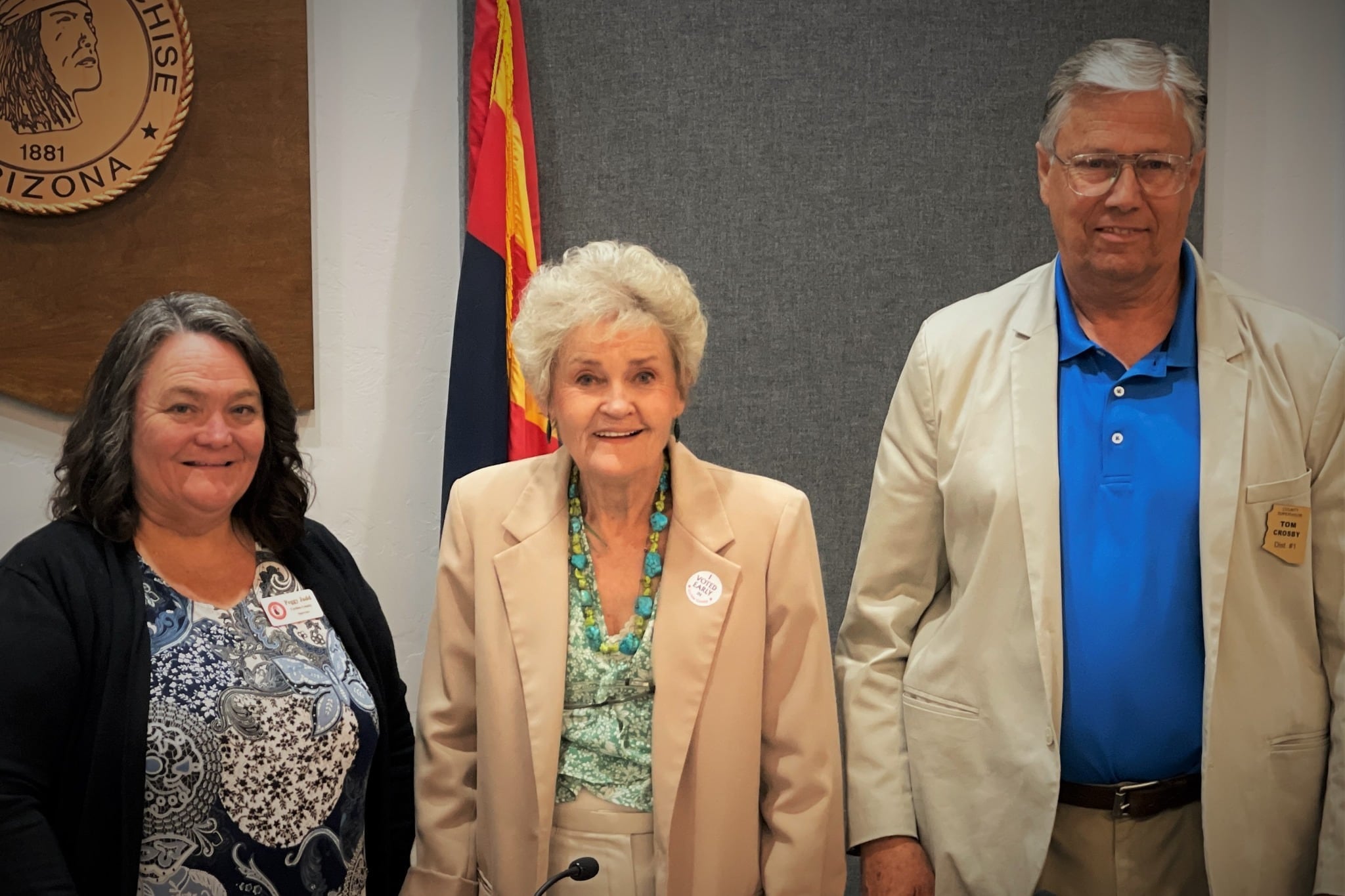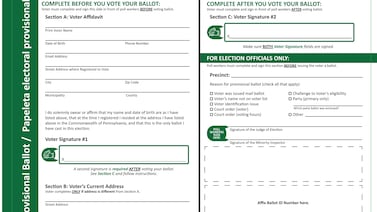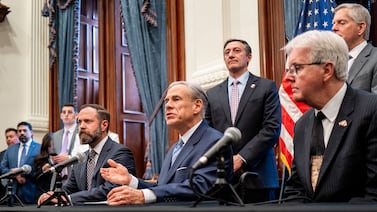Votebeat is a nonprofit news organization reporting on voting access and election administration across the U.S. Sign up for our free newsletters here.
This article has been updated throughout with reactions and additional details.
Attorney General Kris Mayes on Wednesday announced that an Arizona grand jury has indicted Cochise County Supervisors Tom Crosby and Peggy Judd for conspiracy and interference with an election officer, both felonies.
Crosby and Judd, the two Republicans on the three-member board of the southern Arizona county, both refused to certify, or canvass, the county’s election by the Nov. 28, 2022 deadline in state law, twice voting against the canvass.
The Nov. 27 indictments in Maricopa County Superior Court came after the supervisors were ordered to appear at a state grand jury hearing on Nov. 13, under subpoenas issued by Mayes’ office in October. Judd’s subpoena was first reported by Votebeat.
The indictment alleges that on or between Oct. 11, 2022 and Dec. 1, 2022, Judd and Crosby “conspired to delay the canvass of votes cast” and “knowingly interfered with the Arizona Secretary of State’s ability to complete the statewide canvass,” according to a news release from the Attorney General’s Office.
“The repeated attempts to undermine our democracy are unacceptable,” Mayes wrote. “I took an oath to uphold the rule of law, and my office will continue to enforce Arizona’s elections laws and support our election officials as they carry out the duties and responsibilities of their offices.”
Judd and Crosby did not immediately respond to calls for comment Wednesday. But lawyer Dennis Wilenchik, who is representing Crosby, told Votebeat that the indictment has no basis to it and is “political and part of the democratic party playbook to win elections and target conservative republicans.”
“It is not based in fact, would never be brought in a fair and objective AG office, and was brought for some obvious purpose having nothing to do with any legitimate enforcement of the law by the AG that I can see,” Wilenchik wrote in an email.
As the 2024 election approaches, many Cochise residents and voting rights groups such as All Voting is Local said they are hoping this serves as a deterrent for any county supervisors across the state who would consider attempting to interfere with the election.
“This sends a message that you will not be held harmless,” said All Voting is Local’s Arizona director Alex Gulotta. “I really believe it may change people’s behavior.”
Cochise residents who were concerned about the certification fight in November celebrated that the supervisors were being held accountable.
Elisabeth Tyndall, chair of the Cochise County Democratic Party, praised Mayes, also a Democrat, for launching the investigation. She said it wasn’t clear in November if anyone in the state would protect voters, who were afraid the certification delay meant their votes wouldn’t be counted.
“When this first happened a lot of us felt very helpless because there was nowhere to go with this,” Tyndall said. “I think people just have a really huge sense of relief that there is someone else out there that is watching and paying attention.”
Conspiracy and interference with an election officer are both class 5 felonies in Arizona, punishable with up to two and a half years in jail.
Along with refusing to certify the election, Crosby and Judd also voted to fully hand-count the county’s election results through its post-election audit, which a judge blocked after finding that was illegal. The efforts put the rural county in the national media spotlight and caused the elections director to eventually resign citing harassment. Those efforts may have been one of the topics of the investigation but were not part of Wednesday’s indictments.
Mayes investigates at the request of Secretaries of State
Shortly after the supervisors refused to certify the election last November, Kori Lorick, then the state elections director working for former secretary of state and now Gov. Katie Hobbs asked Attorney General Mark Brnovich to investigate. When now-Secretary of State Adrian Fontes took office, he made the same request to Mayes, according to a letter obtained by Votebeat.
“My office considers their failure to do their non-discretionary statutory duty to canvass the election a matter of utmost importance for future elections,” Fontes wrote.
On Wednesday, he sent a one-word tweet about the indictments: “Good.”
In a statement to Votebeat he said that “Accountability is crucial in matters concerning our democracy.”
Former Attorney General Terry Goddard, a Democrat, and former Maricopa County Attorney Rick Romley, a Republican, also wrote Brnovich and Cochise County Attorney Brian McIntyre asking them to investigate, writing that the supervisors’ actions threatened “to undo the proper administration and integrity of elections, disenfranchise thousands of voters and potentially even alter the results of some races.”
Cochise was the only county to bend to pressure from GOP leaders and activists from across the state who immediately after Election Day began claiming the results were inaccurate and asking county supervisors not to certify the election. Lawsuits from three Republican statewide candidates — gubernatorial candidate Kari Lake, attorney general candidate Abraham Hamadeh, and secretary of state candidate Mark Finchem — challenging the election results were eventually dismissed due to lack of evidence.
The indictment says that Crosby and Judd “knowingly interfered with the efforts” of then-Secretary of State Katie Hobbs, now governor, to complete the canvass of the election by preventing the board from canvassing within the time period required by law.
For the conspiracy charge, the indictment says that Judd and Crosby agreed with “one or more persons,” who aren’t named in the indictment, that at least one of them would delay the canvass and the transmission of the canvass to the Secretary of State’s Office.
Under Arizona law, county supervisors must vote to certify, or canvass, their county’s election within 20 days of a general election. It’s a ministerial act, which means supervisors have no discretion as to whether to approve the results. The only exception is if there are any missing returns among polling place results — and even that only warrants a temporary postponement. The secretary of state, in turn, is required to certify the statewide election on the fourth Monday after the election.
Crosby and Judd initially voted to postpone the county’s canvass until the Nov. 28 deadline, after residents spread unfounded claims that ballot tabulation machines used throughout the state were not properly certified. Kori Lorick, the state elections director, then personally provided documentation to the supervisors showing the machines were certified.
When the final deadline of Nov. 28 arrived, Crosby and Judd voted against certification. They did so against the advice of the County Attorney’s Office, which had explained to them that they had a non-discretionary duty.
The Secretary of State’s Office, at the time run by Hobbs, then sued the supervisors, who had to rely on private counsel to represent them on the matter because they had acted against the county attorney’s advice. Their attorney did not appear in court. The trial court judge then forced them to reconvene and vote to certify.
They did, but the vote was still 2-0: Crosby did not show up.
Jen Fifield is a reporter for Votebeat based in Arizona. Contact Jen at jfifield@votebeat.org.







